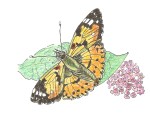Below are some resources for planting, gardening, landscaping, advocacy and DIY projects. Please check our Facebook Page to stay updated on the latest local, national and international pollinator news.
Contact us if you have other resources we should list!
EDUCATION
Coloring Sheets for All Ages
Download and Print:
Marshland.ColoringSheet Monarchs.ColoringSheet,
LunaMoth.ColoringSheet, Pollinators.ColoringSheet
Teaching Tools for Kids
Teaching Kids About Honeybees
This is a nice guide with a number of articles and resources.
Garden-Based Lesson Plans
KidsGardening is a national nonprofit creating opportunities for kids to learn through gardening.
Backyard Environmental Education
This website offers a nice overview of Environmental Education, along with some additional links and resources especially for kids.
The Meadow Project
The Meadow Project’s mission is to educate and raise awareness about sustainable, native, healthy, easy and affordable land care practices that support wildlife and human life. Materials include Hometown Habitat, Stories of Bringing Nature Home, a 90-minute environmental, education documentary and the book and companion DVD Urban & Suburban Meadows.
Bees and Their Habitats in Four New England States
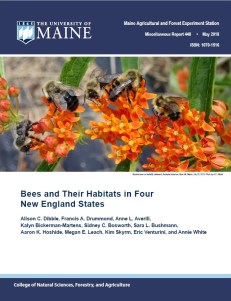
The University of Maine recently published new research on Bees and Their Habitats in Four New England States — an excellent resource for advocating for pollinator habitats.
Bees-and-Their-Habitats-in-Four-New-England-States
Understanding Native Bees
This University of Maine Cooperative Extension bulletin provides just about anything you might want to know about native bees, including profiles of Maine species; advice on how to make your yard “native bee” friendly; and a list of annuals, bulbs, biennials, perennials, shrubs, and trees that provide rich bee habitat. The bulletin also tells you how to create your own bee houses.
PLANT SOURCES
The Wild Seed Project
A great resource for returning native plants to the Maine landscape and assuring that your seeds and plants are pesticide-free.
Got Milkweed?
Wild Seed Project blog post on creating a landscape in Maine to support Monarch butterflies and other pollinating insects.
Balcony Gardens
Wild Seed Project blog post on creating pollinator habitat for urban dwellers.
Highland Farm
Local Maine plants and veggies grown with no pesticides.
Northeast Pollinator Plants
River Berry Farm in Vermont is an online regional provider of native perennials that have been carefully selected to ensure each is of special value to native bees and bumblebees, our most important pollinators. They will ship to New England states and their site also has great guidelines and other info.
New England Flower Society / Nasami Farm
The Society operates a native plant nursery at Nasami Farm in western Massachusetts and owns seven native plant sanctuaries in Maine, New Hampshire, and Vermont, six of which are open to the public.
Native Haunts
Native Haunts, in Alfred, Maine, offers organic nursery production in the form of native plants and seeds, as well as consulting and landscape services.
Skillins Greenhouses
We have been told that all flowering annuals in paper pots have been grown from organic seeds and are not treated with any chemicals in both the Falmouth and Cumberland locations. Great selection of petunias, snapdragons, and many others.
Plainview Farm
Large selection of native plants.
Our research shows that plant starts may not come from pesticide-free sources.
Plants are organically grown once received.
North Yarmouth, Maine (829-5004)
Van Berkum Nursery (WHOLESALE)
Wholesale perennial nursery serving landscapers and garden centers
in Northern New England.
Deerfield, New Hampshire (603) 463-7663
GARDENING & LANDSCAPING
Community Pollinator Garden Guide
Download and Print: Community Pollinator Garden Guide
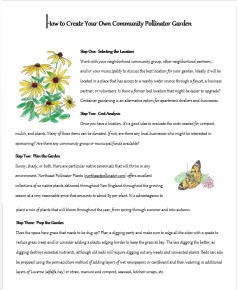
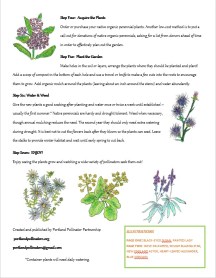
PPP Garden Guides
In partnership with the Wild Seed Project, we created an easy to use guide to pollinator plants, including annuals, perennials, natives, and resources. Click here: Portland Plant Guide.Final to download and print your copy. We have also worked with the Wild Seed Project to develop “sunny” and “shady” Native Pollinator Garden templates with plant recommendations, based on an 8″ x 10″ garden, which can be adapted to a number of garden shapes and sizes:

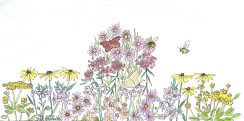
Download printable templates here: Garden.Sun.Template and Garden.Shade.Template.
When you visit your favorite local nurseries, be sure to encourage growers to stock native, pesticide-free pollinator-friendly plants!
Ecological Maine Landscapers
Larkspur Design
Ecological Gardens and Landscapes
with a focus on native plants
Portland, Maine (207-227-8641)
First Light Wildlife Habitats
Experienced wildlife ecologist Deborah Perkins works with clients to customize habitat designs and make site-specific recommendations to create beautifully biodiverse places that support wildlife. This site also has an amazing blog.
Post Carbon Designs
David Homa is a local king of permaculture and original member of Portland Permaculture Meetup, a precursor of the Resilience Hub. He runs a business dedicated to ecological landscapes and permaculture design.
Cassandra’s Garden
New gardening business in York County that is focused on food, medicine, and pollinators. Info about edible landscapes, herbs and more.
Keystone Horticulturists
Portland, Maine (207-797-8733)
Organic Innovations Landscaping
Brunswick, Maine (207-251-9310)
INSPIRATION / DIY
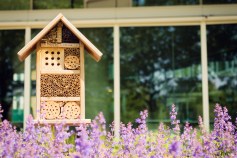
How to Turn Your Backyard Into A Private Wildlife Sanctuary
From honeybees to beautiful birds, it’s easy to make changes to your backyard that will attract wildlife. This article explains how you can transform your backyard and turn it into your very own wildlife sanctuary.
How to Build a Butterfly Garden
This is a great website on what you need to do to build a successful butterfly-friendly garden with lots of other resource links.
Vertical Gardening
No space? Explore vertical gardening.
Landscaping for Butterflies in Maine
Don’t forget the butterflies! Many of the plants that support native bee populations will also attract butterflies, but this bulletin published by the University of Maine Cooperative Extension provides many details about some of the Maine butterfly species and how to develop a suitable habitat for them throughout their life cycles.
Gardening to Preserve Maine’s Native Landscape: Plant to Use and Plants to Avoid
This University of Maine Cooperative Extension publication lists non-native plants considered most invasive in Maine and a list of native plant recommendations.
Ecological Landscaping Alliance
ecolandscaping.org
PESTICIDES
Got Weeds?
Got Weeds? is a Vermont company that uses manual and non-synthetic control methods to eradicate, contain, or suppress non-native invasive plants. It was founded in 2011 on the notion that hard work does pay off when coupled with a pro-active, informed approach to understanding natural systems. The idea that fine-tuned ecosystems can be protected with vigilance, persistence, patience, education, humility, respect, and cooperation is central to the philosophy at Got Weeds?.
Portland Protectors
Started by two moms fed up with their kids being exposed to pesticides in Portland, Maine, Portland Protectors grew to a large network of more than 500 people working to create one of the strongest most comprehensive city-wide synthetic pesticide ordinances in the country to assure all the people who live in, work in and visit Portland are safe from exposure to synthetic cosmetic lawn chemicals.
Need help talking to a neighbor or neighbors about the dangers of pesticides? We have a sample letter written by Portland Pollinators committee member Donna Herczeg that can be helpful. Just print it out and sign! Download here: NeighborLetter
Beyond Pesticides
This is an excellent national organization that works with allies in protecting public health and the environment to lead the transition to a world free of toxic pesticides. Many great articles and resources.
DIY Pest Control
A useful and thorough guide to protecting your garden without toxins.
Mini Dragon Torch
Features chemical-free spot weeding
PETA
Natural and Harmless Alternatives to Garden Pesticides
Friends of the Earth Policy Reports
The Friends of the Earth have some great environmental policy reports available, especially: Buzz Kill: How the Pesticide Industry is Clipping the Wings of Bee Protection Efforts Across the U.S. (Food and Technology). This report has found that the pesticide industry is stifling urgently needed reforms that would help these essential pollinators survive and rebuild their numbers.
What are Neonicotinoids?
The Xerces Society has a lot of information and publishes a helpful info sheet if you want to learn more about these pesticides that affect so many plants and shrubs sold at “big box” stores such as Lowe’s, Home Depot, and other places. Download here: NeonicsSummary_XercesSociety. Another helpful fact sheet can be found here: FAW20Factsheet20neonic_web_e2
Pesticide Notification — Your Rights & Responsibilities
The Maine Board of Pesticides provides information about how to communicate with neighbors who use pesticides and/or how to add your name to the Maine Pesticide Notification Registry to be notified of outdoor, non-agricultural pesticide applications in your vicinity. This is especially useful for suburban and urban residents.
Audubon Connecticut
Excellent steps on reducing and eliminating pesticides and why you would want to in the first place: “Of the over 80,000 pesticides used today, most have never been tested for safety or efficacy. 76 million lbs. of pesticides are used by American homeowners annually. On a per acre basis, American homeowners use 10 times more pesticides than what is used on U.S. farms.”
A Lush Green Lawn Safe for Kids and Pets
The Cumberland County Soil & Water District has a website page on YardScaping that includes a list of recommended companies to use to help maintain your lawn or garden without using dangerous and unnecessary pesticides.
OTHER RECOMMENDED RESOURCES
LOCAL
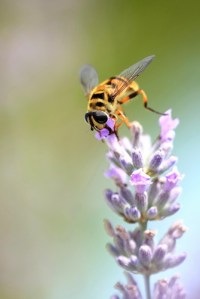
Bee on Lavender Courtesy of Denis Spycher/National Geographic
Maine Audubon
Get close to nature. The state’s oldest and largest wildlife conservation organization connects people to nature through a science-based approach to conservation, education, and advocacy. Events include an annual Pollinator Parade and a Native Plant Sale and Festival. Eight wildlife sanctuaries include Gilsland Farm in Falmouth, Maine, 65-acres including trails.
Maine Organic Farmers and Gardeners Association
The Maine Organic Farmers and Gardeners Association is a broad-based community that educates about and advocates for organic agriculture, illuminating its interdependence with a healthy environment, local food production, and thriving communities.
Creative Native Plant Corridors for Pollinators
This excellent article published by the Maine Organic Farmers and Growers Association (MOFGA) was written by Heather McCargo, Executive Director of the Wild Seed Project. It describes how to create sustainable native pollinator habitat.
Southern Maine Conservation Collaborative
The Southern Maine Conservation Collaborative was founded in 2012 as a service center to assist conservation organizations in southern Maine with hands on assistance specific to organizational needs. They also serve to build connections within the conservation sector, and between conservation and broader community issues.
Wildflowers of Maine
This U.S. wildflowers database includes photographs and descriptions of Maine’s wildflowers, both native and introduced.
NATIONAL
Bringing Nature Home: Doug Tallamy
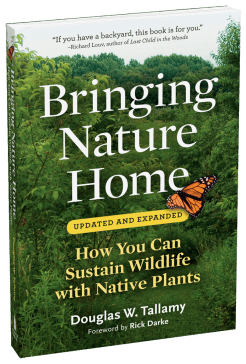
Doug Tallamy is a professor in the Department of Entomology and Wildlife Ecology at the University of Delaware, where he has authored eighty research articles and has taught Insect Taxonomy, Behavioral Ecology, Humans and Nature, and other courses. Chief among his research goals is to better understand the many ways insects interact with plants and how such interactions determine the diversity of animal communities. His book Bringing Nature Home was awarded the 2008 silver medal by the Garden Writer’s Association. Watch A Chickadee’s Guide to Gardening talk at Maine Audubon.
Mason Bee Revolution
 Mason Bee Revolution: How the Hardest Working Bee Can Save the World One Backyard At a Time by Dave Hunter and Jill Lightner explains how docile, hard-working, solitary mason bees (and their compatriots, the leafcutter bees) are even more productive pollinators than honeybees, and keeping them can be a fun, easy, backyard hobby for gardeners, conservationists, foodies, and families everywhere.
Mason Bee Revolution: How the Hardest Working Bee Can Save the World One Backyard At a Time by Dave Hunter and Jill Lightner explains how docile, hard-working, solitary mason bees (and their compatriots, the leafcutter bees) are even more productive pollinators than honeybees, and keeping them can be a fun, easy, backyard hobby for gardeners, conservationists, foodies, and families everywhere.
Great Pollinator Project
Founded in 2007 by the Center for Biodiversity and Conservation at the American Museum of Natural History and the Greenbelt Native Plant Project, this site is a wealth of information. Its Education page provides curricula on pollinators and pollinator conservation suitable for K-12 students.
Pollinator Partnership
The North American Pollinator Protection Campaign (NAPPC) is the most important project managed by the Pollinator Partnership. Based in San Francisco, it is a collaboration of individuals and organizations representing all aspects of the pollinator issue. Since 1999 this group has worked tirelessly to promote and protect pollinators and the agricultural and ecological services they provide. A wealth of resources, including planting guides for a variety of regions, can be found here.
The Xerces Society
This is a nonprofit organization that protects wildife through the conservation of invertebrates and their habitat. They use advocacy, education, and applied research, publish articles on insect conservation, trained farmers and land managers to protect habitat, and much more.
Studio G: Ideas and Inspiration for Garden Makers
Want some visual inspiration? This blog page has some creative examples of bee walls and houses, including functional sculptures.
BeeSmart Pollinator Gardener App
Yes, there’s an app! Available on both Android and iOS platforms, it allows you to browse through a database of nearly 1,000 plants, by region, soil type, color preference, and more.
Best Nest Wordworking Pro
Not good with wood? A variety of houses are available for sale at a range of prices.
Please visit our Facebook Page for more news, updates and articles.

